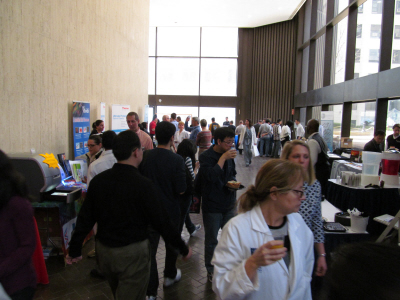Researchers at Rockefeller University, led by Dr. Gaby Maimon, recently received NIH funding for their studies of fruit flies’ neuronal activity in decision-making, which they believe has the potential to impact pharmaceuticals for human mental illness. According to the Rockefeller University website, Dr. Maimon’s research team aims to “link the electrical activity of neurons and the biochemical action of molecules to their computational roles in animal behavior. The lab has a particular interest in understanding how central brain structures, distant from the sensory and motor periphery, govern behavioral choice.” The latest research grant money has been given to an ongoing project titled “Linking Genes to Higher Brain Function by Way of Cellular Electrophysiology.” The project received $2.5 million from the NIH. The NIH RePORTER details the goals of the project in an abstract posted online:
“Work in genetic model organisms has connected genes to behavior. Electrophysiology in awake, behaving animals has associated neuronal activity with cognition and action. This proposal lies at the interface of these two fields. We aim to reveal how genes, through their effects on cellular electrophysiology, influence higher brain function and behavior. We focus on a specific higher function, decision-making: the mental process that precedes and ultimately yields a behavioral choice. A healthy brain allows for choices that are adaptive and flexible. In drug addiction and mental illnesses such as depression, obsessive-compulsive disorder, and schizophrenia, behavioral choices are maladaptive, stereotypical, and repetitive. A deeper understanding of decision processes could improve the health of many. We propose to study decision-making in the fruit fly, Drosophila melanogaster, where there is a unique opportunity to form cross-disciplinary insights.”
To conduct their study, researchers will record the electrophysiological signals from neurons in actively behaving fruit flies and record and manipulate neuronal activity while the flies make decisions. The study’s aim is to understand how genes, through their effect on cellular electrophysiology, affect decision-making. The researchers hope their work will eventually lead to better drug design for human mental illness.

Rockefeller BioResearch Product Faire™ Event
In addition to receiving this latest research grant, Rockefeller University receives a great deal more funding from the NIH and NSF. Lab suppliers marketing life science products and working to sell lab equipment in New York may also be interested in the following funding statistics: In 2012, the NIH gave Rockefeller University $70.1 million. For a full list of departments receiving NIH funding organized by department name, number of awards received and total funding awarded, please visit the NIH website. Rockefeller University also received $844,385 from the NSF in 2012. For a full list of projects receiving NSF awards, please visit the NSF website.
Biotechnology Calendar, Inc. invites all lab suppliers working to market their life science products and sell lab equipment at New York life science marketing events to attend our Rockefeller BioResearch Product Faire™ Event on October 2nd, 2013. Last year, the Rockefeller BioResearch Product Faire™ Event attracted 398 attendees. Of the attendees, 102 were purchasing agents, professors and post docs, and 22 were lab managers. The visitors came from 28 different research buildings and 77 departments across campus.
Biotechnology Calendar, Inc. is a full-service science research marketing and events-planning company that organizes life science marketing events at top research institutions nationwide. If you’d like to market your life science products and sell lab equipment at other life science marketing events closer to home, we encourage you to view our 2013 calendar of events. For more information on our Rockefeller BioResearch Product Faire™ Event, or to view more funding statistics for Rockefeller University, click on the button below.








